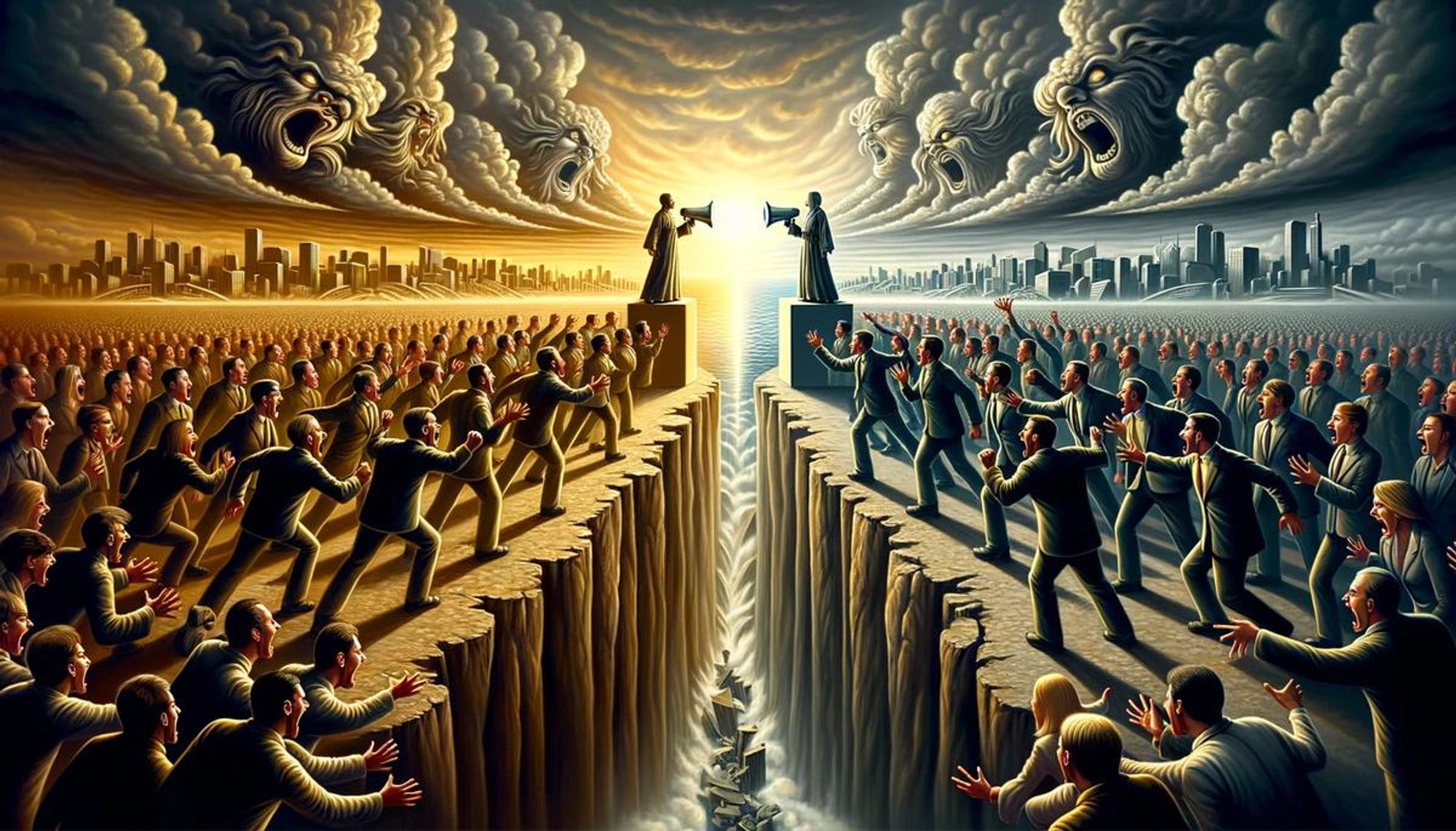Hypertruth: when opinion prevents the debate from beginning
date
Apr 2, 2024
slug
2024-hypertruth-when-opinion-prevents-the-debate-from-beginning
status
Published
tags
truth
doubt
journalism
reality
simulation
type
Post
summary
The debate is becoming increasingly difficult to follow, as certainties are suffocating everything that opposes them.

How can a dialogue begin if one party refuses to make concessions in advance? This question pervades the processes within all democratic societies in one way or another. It's not surprising; it's simply an indicator that a relationship has lost its constructive nature. What's surprising is that it's not just conservatives, who are often resistant to new ideas in their desire to maintain the status quo. What's astounding is seeing liberals fiercely clinging to their identities to the point of having nothing but certainties. When these two extremes converge, trouble is likely on the horizon.
There are two concepts that are accessory to this debate. The first is the idea of non-identity, from Theodor W. Adorno. Roughly explaining, Adorno, who had the fresh example of Auschwitz as the ultimate destruction of everything human, proposed non-identity. Non-identity refers to the idea that there is always a remainder or an excess in every object that cannot be fully captured or exhausted by our concepts or language. According to Adorno, our thoughts, concepts, or categories cannot completely grasp the full reality of objects or experiences. There's always something about the object that eludes our conceptual grid, because unlike what almost everyone in the public sphere today might think, our minds are incapable of doing so. Failure to accept differenced leads to oppression, and one might say that this is an understatement
The idea of the gap in our understanding of reality is complemented by another proposition Adorno made. For him, truth was not a singular object, but a constant tension between subject and object, something he beautifully described as “the force field between subject and object”. This idea encompasses what we understand as “real” as an ongoing process. Our interaction with the world around us shapes reality. The differences we observe reflect back on ourselves. The non-identity is the gap that allows us to comprehend a part of the reality that we fail to see. Even though almost a century has passed since his thoughts were conceived, it is astonishing how well they fit the current moment.
What we witness today in the polarised debates within world democracies is the denial of non-identity. The left and right are engaged in a struggle they perceive as the only fair one possible because they believe they hold all the answers. This belief is a gift from the digital world, specifically social media, which manufactures certainties, eternally validating our own ideas, for a price as cheap as validating them back. Both extremes, arrogant in their certainties, fail to see the abyss they are creating because they deny non-identity. They refuse to accept that there is a part of the whole our minds cannot grasp, thus, they head towards conflict. The truth has become a sort of "hypertruth," a version of reality that leaves no room for doubt, much like the truths of the Third Reich, Stalinist Soviet Union, or the bloody marshes of Pol Pot, a dystopic shadow that resembles everything and anything at the same time.
Reality was shattered long before social media, as simulation, simulacra, and hyperreality overcame reality. We perceive a world that does not exist, or as Chuck Palahniuk’s nameless character in Fight Club, “everything is a copy of a copy of a copy…”. The images in our minds are merely idealisations of reality. When Jean Baudrillard wrote Simulacra and Simulation, the "immaterial" environment was nothing like it is today. Even though representations had already supplanted the material, there were no infinite layers of simulation over anything. The digital representation has blurred the lines of reality with a force that our minds probably cannot fully comprehend. We lack the hardware and software to do this, but awareness and willingness could help. Needless to say, we have even less of these too.
Is it fair to place the blame on the extremes? What about the non-radicals? The centrists, the reasonable, the open-minded? They likely understand much more of the problem than the self-proclaimed owners of reason. However, to rally all parties to fix a problem that neither wants to address, a tragic event has to be the trigger. Although technology has significantly contributed to the toxicity of our times, in the past, other "new technologies" like newspapers, radio, and phonographs were hastily used to declare that all certainties had been found and nothing, not even God, was needed. In short: people in the middle know they are heading to their slaughterhouse, but they know that yelling won't help. Perhaps it's another symptom of the prelude to tragedies: once you know your fate is inescapable, you become as docile as an old horse.
Who is feeding this sick frenzy? There are basically two kinds of people. The first are the ones with money and power. Why would you risk changing a situation you judge to be good? The second is the yelling ones. The ones that annoy, attack, offend everyone else in the social media sphere, a real Sturmabteilung platoon of our times. Make no mistakes: a century ago, instead of cancel culture we’d be talking about beatings, brawling and physical bullying. These are the fools that are bot fodder for revolutions, the process of changing one elite for another, optimising the number of fools to be killed in the meantime. Is there a way out? Of course there is. Will we find it? No. We have too sure about everything to search for a way out.